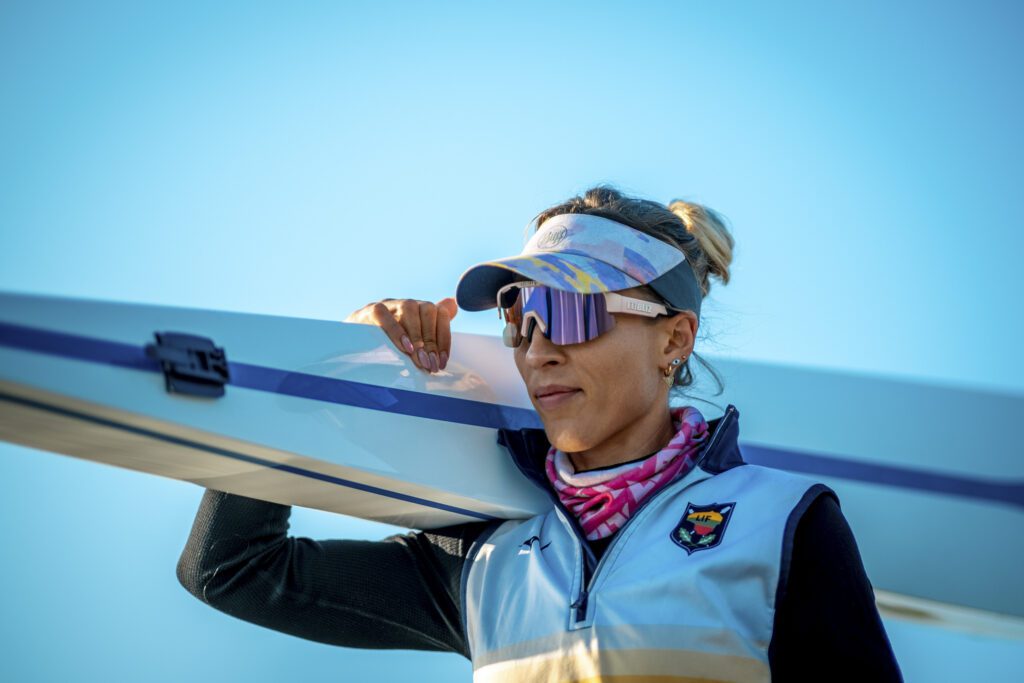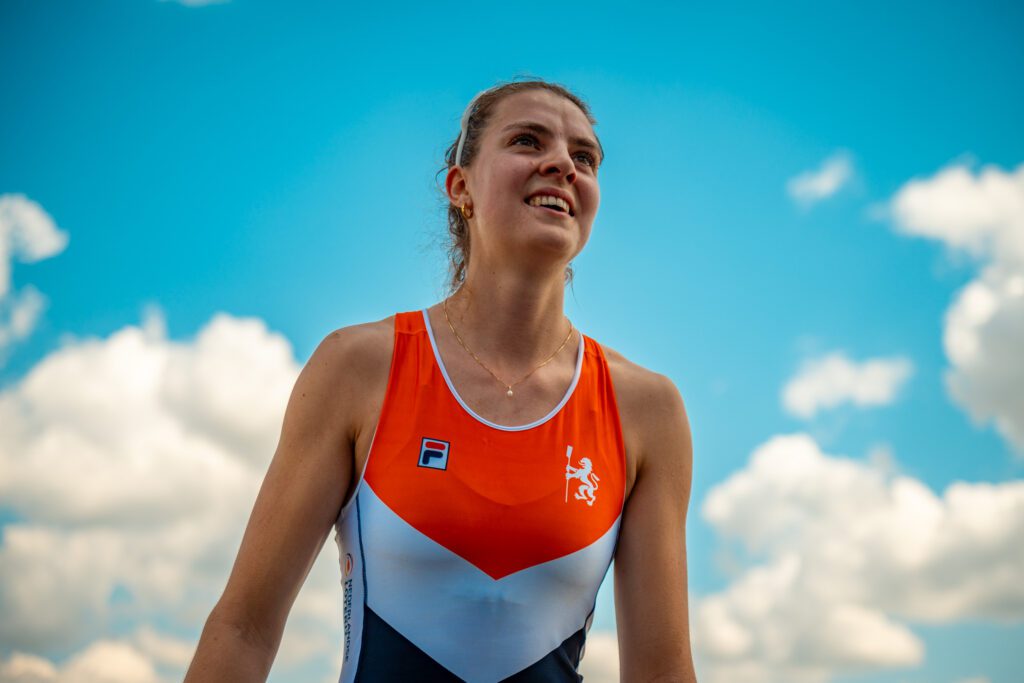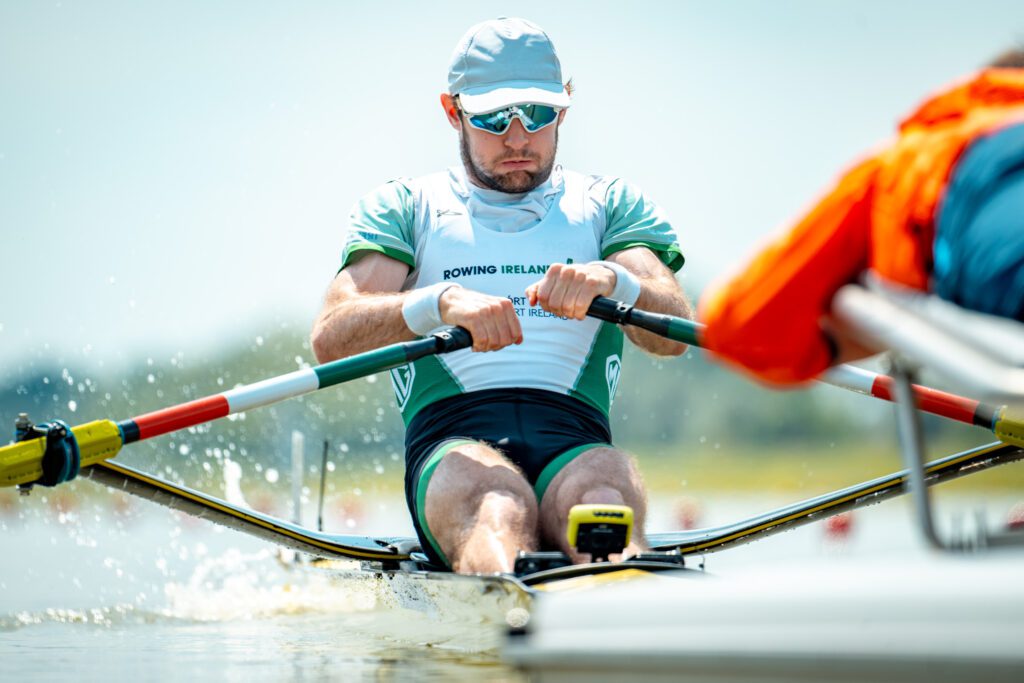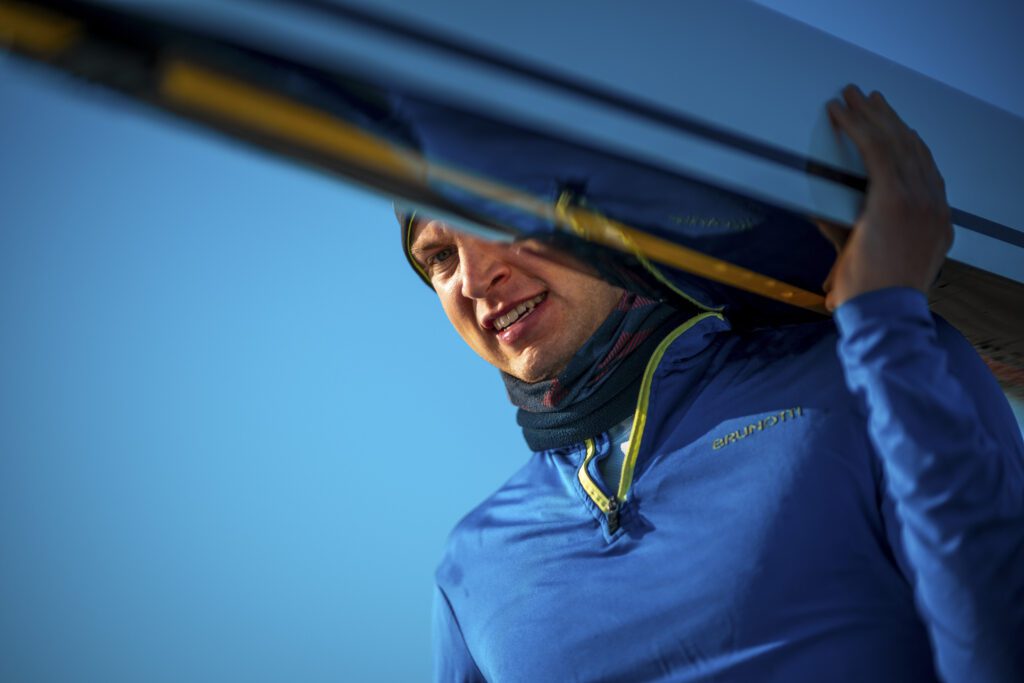Varese’s got a short timetable, with a relatively small but high quality entry, and so Saturday’s racing was a half-day for everyone, starting at 10am with a few minor finals and ending comfortably before lunchtime. The odd breath of breeze on the lake barely rippled the water, leaving racers free to concentrate on one another and their technique. Be warned, it may be very different in Paris this summer.
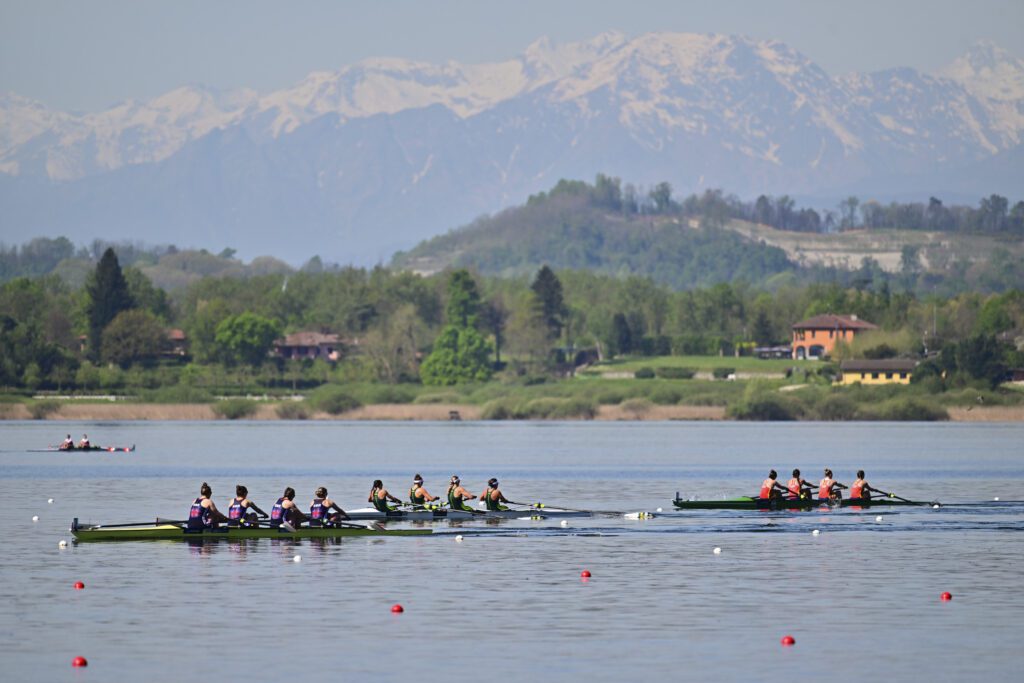
Credit Benedict Tufnell
First of the day to get a finish beep were the small finals of the single sculls, a fascinating mix of those who are peaking to try and clinch qualification in either Hungary or Lucerne, and a few who have already qualified for Paris via a continental regatta and are now honing skills against other nations. So Uganda’s Kathleen Noble was just getting race practice, while W1x C-final winner Ghada Ibrahim (EGY) did a good job overtaking and beating the Finnish and Swedish scullers, at least one of which she’s likely to meet in Lucerne unless they both qualify at the European regatta in Szeged two weeks from now.
Similarly the M1x C-final skirmish was mostly between Italy’s Gennaro di Mauro, who won, and Ireland’s Brian Colsh, who came second, neither of whom have yet clinched Olympic berths, while Egypt’s Abdelkhalek Elbanna and Paraguayan Javier Insfran, who have, picked up useful experience finishing third and sixth. Squashed between them in fifth was Quentin Antognelli, the Monégasque who sculled for his country in Tokyo and will no doubt be entering the European qualification to see if he can repeat the feat. Also entering the qualification fray will be Kjetil Borch (NOR), the former world champion who has had a difficult Olympiad so far, and who won the Varese D-final.
Then it was into repechages, each race tinged with the knowledge that faster crews had already got through and will be lurking in tomorrow’s final. So whilst Denmark and Italy, then Britain’s second crew and Croatia had great battles in the men’s pairs (the former winning in each case), all four of them will have to face medal favourites Switzerland and GBR1 on Sunday. The latter of those was the second defeat for the Sinkovic brothers this weekend, after a blistering sprint by GBR2.
The only events to have full-blown semifinals this time were the single sculls, chucking four fascinating races into the middle of Saturday’s racing. Karolien Florijn (NED) kept a watchful eye and a smidge of clear water over her rivals to win the first women’s semi, with Alexandra Foester (GER) recovering after a less impressive Friday performance and Paris hopeful Virginia Diaz Rivas (ESP) fending off Ukrainian assaults comfortably for the third finals spot. The second semi was won by Norway’s Inger Seim Kavlie slightly ahead of Irishwoman Sanita Puspure, both of whom are expected to try and qualify during the next month, and who will be encouraged to have posted quicker times than Diaz Rivas.
Row360 coverage of the 2024 World Rowing Cup Series
The men’s semis involved shadowboxing from Olli Zeidler (GER), holding back slightly while making sure he still beat Simon van Dorp (NED). Then Damir Martin (CRO) had one of his best races for years leading and winning the second semi despite being under severe pressure from three others including eventual qualifiers Davide Mumolo (ITA) and Tim Brys (BEL). Britain’s latest single sculler George Bourne saw off Konan Pazzaia (IRL) and Mykola Kalashnyk (UKR) for a spot in the A-final from the first semi, encouragingly close to Zeidler and van Dorp.
Ukraine’s men’s four managed to claim an A-final place behind the Dutch and 0.05 seconds ahead of the Danes, the closest decisive margin of the day. Australia’s men’s quad had a good time beating Germany in the M4x repechage, while Romania claimed a predictable win in the W8+ repechage. The men’s eights rep was hotly contested, the beleaguered (but already Olympic-qualified) German squad trying to hold off Italy but unable to stop them in the second half, while Romania, who have also already bagged their Paris place, were well ahead of Austria, who haven’t. Italy are expecting to come up against the USA and Canada at the FQOR in Lucerne four weeks from now, so will want to beat as many as possible of the other European nations yet to qualify, to boost their chances.
Racing ended with two A-finals for the solo lightweights, Olivia Bates (GBR) burning through Tunisia’s quick-starting Khadija Krimi and then pushing away from the pack for a solid Saturday gold medal, while Maia Emilie Lund (NOR) and Tosca Kettler (NED) pushed her hard but ended with silver and bronze. Krimi is already qualified for Paris in the lightweight doubles but her partner Selma Dhaouadi isn’t here in Italy. In the men’s lightweights final Peter Strecansky (SVK) led first but was then passed by Italy’s Patrick Rocek with another member of the Italian lightweight stable, Matteo Tomelli, chasing the pair of them. Rocek snared gold but only just after a humungous 500-metre charge from Arno Gaus gave Germany silver and pushed Strecansky into third. Great racing.
Sunday’s finals will answer several questions, from what will happen to some of the top names who haven’t quite been on form here yet, to whether Britain’s women’s sweep squad can spare enough energy to fight the Irish and Dutch for fours medals before doubling up into the eight. Hosts Italy have their best chances in the light and heavy men’s doubles, and the men’s fours, while the Dutch will be planning on at least one sculling gold, plus a good go at the British in the men’s eight. The biggest rivalries are between Swiss and British sweep men, the women’s singles is full of interestingly inconsistent performers (behind Florijn) and there’s the tantalising possibility of some fun in the M1x when Damir Martin (CRO) tries to take on German powerhouse Olli Zeidler and Dutch 2023 runner-up Simon van Dorp at the same time. Fireworks are predicted.
